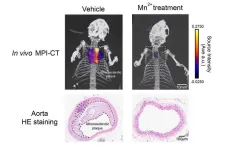(Press-News.org) Regular and moderate physical activity can significantly improve the quality of life of people with internal diseases such as cancer and depression. Unfortunately, many people with internal disorders cannot sufficiently participate in exercise training for several reasons. For example, they often do not have access to appropriate exercise training programs, have a high therapeutic burden, fatigue, or simply no time to engage in physical activity. Accordingly, the Sports Medicine research group led by Professor Perikles Simon at Johannes Gutenberg University Mainz (JGU) investigates how physical activity can be promoted and integrated into patients' daily lives by applying digital tools such as wearables and mobile apps in combination with secure data transfer and state-of-the-art data analysis. Overall, the primary aim of the research approach is to improve patients' quality of life. "With this smart data concept, we want to employ a digital infrastructure to support people with internal diseases as well as the exercise therapists who guide the patients' exercise therapy," said Barlo Hillen, research associate of JGU's Department of Sports Medicine, Disease Prevention, and Rehabilitation. The JGU Sports Medicine is involved in two related research projects coordinated by the Mainz University Medical Center: DECIDE, sponsored by the German Federal Ministry of Education and Research, and the EU project RELEVIUM.
DECIDE: Algorithms and smartwatches to be used for the benefit of patients
The JGU Sports Medicine research group strives to ensure advanced exercise load management for patients. The group wants to support patients in better coping with their individual disorders, improve their personal well-being, and increase their capability to deal with daily tasks or at least maintain this ability even as the disease progresses. The new project "Decentralized Digital Environment for Consultation, Data Integration, Decision Making, and Patient Empowerment" (DECIDE) is coordinated by Dr. Torsten Panholzer, head of Medical Informatics at the Institute of Medical Biostatistics, Epidemiology, and Informatics (IMBEI) at the Mainz University Medical Center. One of the main objectives of DECIDE is to improve the level of support services available to patients with colon cancer, lung cancer, or depression living in the rural regions of Rhineland-Palatinate. The networking of regional hospitals, physicians, self-help groups, and researchers is coordinated by the University Medical Center of Johannes Gutenberg University Mainz. The research results are intended to directly support patients.
Collaborating with the Fraunhofer Institute for Industrial Mathematics (ITWM), the JGU research group plans to apply intelligent digital support systems that will enable individualized control of patients' daily physical activity. A smartwatch will register the patients' vital data as well as their perceived exertion and pain. The data is transmitted to an app on the patients' smartphone and from there to their therapists. A feedback loop and an automated data analysis system will ensure the appropriate modification of training recommendations for each individual on a regular basis. "In previous projects, it was necessary to analyze exercise protocols and draw up training plans manually. That was very time-consuming. Our digital tools will be able to process most of this work automatically, enhancing the efficiency of the process," added Hillen. Depending on the individual patient, recommendations may include moderate strength exercise, endurance exercise, i.e., brisk walking or jogging in intervals, and mobility training. The advocated forms of exercise will fit in the patient's daily routine. The aim is to minimize any potential logistical or financial barriers that might discourage patients from exercise participation.
Partners of the Mainz University Medical Center and the JGU Sports Medicine research group in the DECIDE project are the Fraunhofer Institute for Industrial Mathematics and the MCS Data Labs GmbH in Berlin. DECIDE is currently in the pilot phase studying healthy subjects. The German Federal Ministry of Education and Research (BMBF) is funding the project with EUR 5.5 million as part of its Digital Strategy program.
RELEVIUM: Improving the quality of life of pancreatic cancer patients
The EU project RELEVIUM aims to support patients with advanced pancreatic cancer. Their pain and uncontrolled weight loss should be alleviated based on highly personalized approaches including nutrition, physical activity, and pain management – along with chemotherapy. Digital systems with automated evaluation algorithms will in particular facilitate the monitoring of the patients' sarcopenia, nutritional intake, physical activity, and pain perception. The JGU Sports Medicine research group will give advice on suitable physical exercise and support the project consortium by planning and implementing randomized clinical trials in five medical centers in Europe, subsequently analyzing the extensive collected data.
"We will determine the effect of the smart data concept and investigate if patients do actually benefit from the use of digital tools and experience a better quality of life," said Barlo Hillen. With regard to physical activity, training programs will be organized similar to DECIDE, but these will be specifically adapted to the needs and abilities of people with pancreatic cancer. Pancreatic cancer has one of the lowest survival rates among cancers and is responsible for 95,000 cases of deaths per year in the EU alone.
The RELEVIUM consortium consists of 18 partners in ten countries. Major European medical and cancer centers in Belgium, Estonia, France, and Israel are included in RELEVIUM. The European research network is being coordinated by Professor Markus Moehler of Medical Clinic I at the Mainz University Medical Center. The project was launched on 1 September 2022 with a feasibility study involving both diseased and healthy participants and is planned to run until 2026. The European Union provides funding of about EUR 6 million for the project.
Related links:
https://www.blogs.uni-mainz.de/fb02-sports-medicine/ – Department of Sports Medicine, Prevention, and Rehabilitation at the JGU Institute of Sports Medicine
https://www.itwm.fraunhofer.de/en/departments/optimization/life-sciences/ai-lifestyle-pancreatic-cancer.html – RELEVIUM: Lifestyle Optimization for Pancreatic Cancer
https://www.releviumproject.eu/ – EU-funded project RELEVIUM
https://decide.imbei.uni-mainz.de/decide/ – DECIDE: Decentralized Digital Environment for Consultation, Data Integration, Decision Making, and Patient Empowerment [in German]
https://www.itwm.fraunhofer.de/en/departments/optimization/life-sciences/decide.html – DECIDE: Integrated Digital Solutions for Oncology END
Exercise therapy based on smart data to improve patients' quality of life
Establishing a digital assistance system based on artificial intelligence to support patients / Sports Medicine research group of Mainz University involved in two projects coordinated by the Mainz University Medical Center
2023-11-02
ELSE PRESS RELEASES FROM THIS DATE:
Alternative antibiotic selection can reduce the risk of healthcare-associated infections for patients with pneumonia
2023-11-02
Arlington, Va. — November 2, 2023 — A new study published today in the American Journal of Infection Control (AJIC) reveals that the use of doxycycline may help protect against Clostridioides difficile (C. diff) infection for some patients with pneumonia. Specifically, study authors found that for hospitalized patients with community-acquired pneumonia who had experienced C. diff infections in the prior year, the use of doxycycline, instead of the more commonly used azithromycin, reduced the development ...
Survey finds most Americans are unaware of many signs that someone is having a seizure
2023-11-02
Orlando, Fla - If you’ve ever seen a movie or TV show in which a character has a seizure, you probably have a fairly standard mental picture of someone falling to the ground in full body convulsions while foaming at the mouth. But that doesn’t necessarily reflect reality. A new national survey by Orlando Health finds that while most Americans recognize those classic symptoms of what’s called a generalized tonic-clonic seizure, the majority fail to recognize the subtle signs, all of which can be dangerous and have a profound ...
A “manganese bullet” targeting the top killer?
2023-11-02
Cardiovascular diseases (CVDs) continue to rank as the top killer in the modern world. This deadly disorder often starts with the buildup of lipid deposits or plaques within the blood vessel, silently setting the stage for atherosclerosis. Rupture of these atherosclerotic plaques, however, could clot blood vessels and lead to life-threatening conditions including heart attack or stroke.
Dyslipidemia, meaning having too much “bad” or atherogenic lipids in the blood, represents the most common cause of CVDs and ...
New NUS study provides insights into early breast cancer development in individuals with BRCA2 mutations
2023-11-02
A pioneering study led by Professor Ashok Venkitaraman from the Cancer Science Institute of Singapore (CSI Singapore) at the National University of Singapore and Dr Mona Shehata from the University of Cambridge (UK) has uncovered vital insights into the distinct effects of BRCA2 mutations on breast tissue cells, shedding light on early breast cancer development in people with BRCA2 mutations. The research was published in the prestigious journal Nature Communications on 25 August 2023.
Breast cancer is a serious concern for individuals with BRCA2 mutations, ...
Clinical intervention directed at social risks does not increase experiences of discrimination
2023-11-02
A growing recognition of the health impact of social risks – such as food insecurity and homelessness – has prompted researchers, healthcare providers and policymakers to consider ways to address these risk factors as part of holistic clinical care. However, some healthcare providers worry the same interventions designed to help patients and families with social risks might also make them feel singled out or like they are otherwise stigmatized.
Now, new results of a rigorous study from the University of Chicago Medicine published October 2023 in JAMA Pediatrics suggest well-designed interventions that address social risks can be provided ...
$13M NIH grant funds research aimed at revitalizing immune systems of older adults
2023-11-02
University of Arizona Health Sciences researchers received a $13.1 million grant from the National Institute on Aging to continue studies aimed at rejuvenating the immune system of older people in order to improve health throughout the lifespan.
Older adults are disproportionally affected by infection, cancer and certain types of autoimmune disease. This is influenced by the fact that as a person ages, their body produces fewer T cells and gets less proficient at maintaining them. T cells are a type of white blood cell essential to the immune ...
Study provides preliminary evidence in favor of a new type 1 diabetes treatment
2023-11-02
Type 1 diabetes is an autoimmune disease that causes the body's immune system to attack and destroy insulin-producing beta cells in the pancreas. Traditional management of type 1 diabetes has primarily involved replacing the missing insulin with injections which, though effective, can be expensive and burdensome. A new study led by researchers at the University of Chicago Medicine and Indiana University suggests that an existing drug could be repurposed to treat type 1 diabetes, potentially reducing dependence on insulin as the sole treatment.
The research centers on a medication known as α-difluoromethylornithine (DFMO), which inhibits an enzyme that plays a key role in cellular ...
New branch of oncology, cancer neuroscience, offers hope for hard-to-treat brain tumors
2023-11-02
Cancer cells hijack normal biological processes, allowing them to multiply. For example, tumors spur construction of new blood vessels, building themselves “highways” to supply nutrients.
Researchers have known about cancer’s blood vessel infiltration for decades, but it was only in the past few years that Stanford Medicine scientists and their colleagues discovered that tumors don’t just tap the body’s highway system; they can also infiltrate and exploit its “telecommunications.”
To ...
Less physical activity in adolescence likely rooted in biology
2023-11-02
AURORA, Colo. (Nov. 1, 2023) – The slowdown of physical activity during adolescence is not likely caused by lifestyle and environment but by energy demands placed on the body as it grows and sexually matures, according to a new study by researchers at the University of Colorado Anschutz Medical Campus.
The study, published today in the Proceedings of the Royal Society B, examined the lifestyles of the physically active Tsimane people, an indigenous population of forager-horticulturalists in lowland Bolivia, to see similarities and differences to adolescents living in post-industrialized nations.
“We wanted to look at the role of environment and the role of biology,” ...
Adult coral can handle more heat and keep growing thanks to heat-evolved symbionts
2023-11-02
Adult fragments of a coral species can better tolerate bleaching and recover faster when treated with tougher heat-evolved symbionts, new research from the Australian Institute of Marine Science (AIMS) and the University of Melbourne indicates.
The study also found that treatment with the heat-evolved symbionts did not compromise the coral’s ability to grow. This differs from previous studies on Great Barrier Reef corals which found that naturally heat tolerant symbionts could enhance heat resistance in adult corals, but at a cost to its growth.
Symbionts are the tiny cells of algae that live inside the coral tissue, providing corals with energy to grow. The survival ...
LAST 30 PRESS RELEASES:
Heart attack deaths rose between 2011 and 2022 among adults younger than age 55
Will melting glaciers slow climate change? A prevailing theory is on shaky ground
New treatment may dramatically improve survival for those with deadly brain cancer
Here we grow: chondrocytes’ behavior reveals novel targets for bone growth disorders
Leaping puddles create new rules for water physics
Scientists identify key protein that stops malaria parasite growth
Wildfire smoke linked to rise in violent assaults, new 11-year study finds
New technology could use sunlight to break down ‘forever chemicals’
Green hydrogen without forever chemicals and iridium
Billion-DKK grant for research in green transformation of the built environment
For solar power to truly provide affordable energy access, we need to deploy it better
Middle-aged men are most vulnerable to faster aging due to ‘forever chemicals’
Starving cancer: Nutrient deprivation effects on synovial sarcoma
Speaking from the heart: Study identifies key concerns of parenting with an early-onset cardiovascular condition
From the Late Bronze Age to today - Old Irish Goat carries 3,000 years of Irish history
Emerging class of antibiotics to tackle global tuberculosis crisis
Researchers create distortion-resistant energy materials to improve lithium-ion batteries
Scientists create the most detailed molecular map to date of the developing Down syndrome brain
Nutrient uptake gets to the root of roots
Aspirin not a quick fix for preventing bowel cancer
HPV vaccination provides “sustained protection” against cervical cancer
Many post-authorization studies fail to comply with public disclosure rules
GLP-1 drugs combined with healthy lifestyle habits linked with reduced cardiovascular risk among diabetes patients
Solved: New analysis of Apollo Moon samples finally settles debate about lunar magnetic field
University of Birmingham to host national computing center
Play nicely: Children who are not friends connect better through play when given a goal
Surviving the extreme temperatures of the climate crisis calls for a revolution in home and building design
The wild can be ‘death trap’ for rescued animals
New research: Nighttime road traffic noise stresses the heart and blood vessels
Meningococcal B vaccination does not reduce gonorrhoea, trial results show
[Press-News.org] Exercise therapy based on smart data to improve patients' quality of lifeEstablishing a digital assistance system based on artificial intelligence to support patients / Sports Medicine research group of Mainz University involved in two projects coordinated by the Mainz University Medical Center


